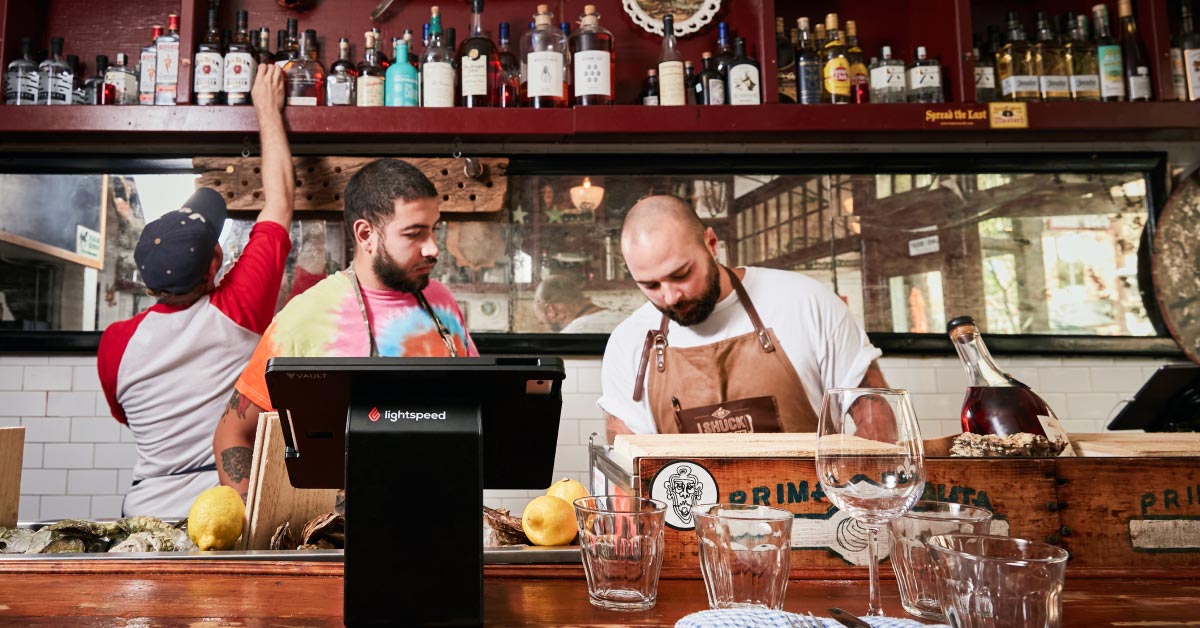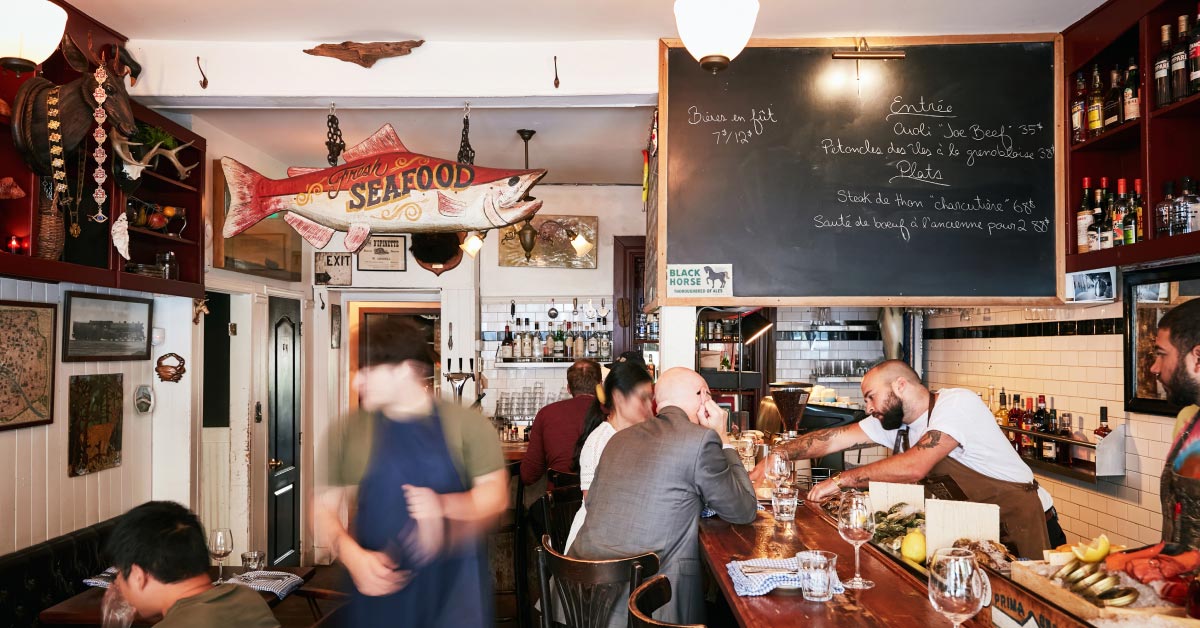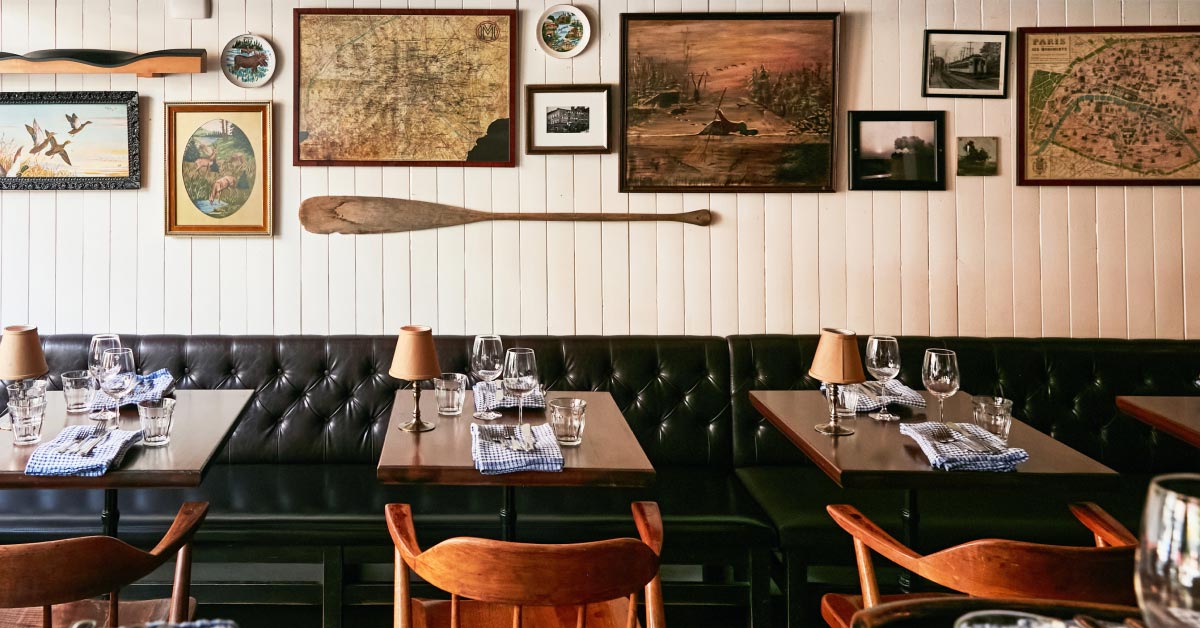
Montreal’s iconic Joe Beef needs little introduction. Its founders, Frédéric (Fred) Morin and David McMillan, quickly gained an international reputation as much for their over-the-top personalities as for their luxurious french food. A favorite of the late Anthony Bourdain and featured on an episode of Parts Unknown, anyone who knows anything about food knows the name Joe Beef.
A lot has changed since Joe Beef first opened its doors in 2005. The restaurant has more than doubled in size, three more restaurants opened under the group—Liverpool House, Vin Papillon and McKiernan Luncheonette—and co-founder David McMillan retired from the industry at the end of 2021. In an interview with Fred Morin, we talk about how the industry has changed since the early days of Joe Beef, what creativity is and the future of dining.
Learn how the right technology and processes can help you transform your restaurant and offer a one-of-a-kind dining experience.Prepare your business for long-term success
How has Joe Beef evolved since it opened its doors almost 20 years ago?
It may be presumptuous to say it evolved. It did change, but it’s totally subjective. I mean, it occupies more space, the menu has changed, the portions are less obscene than before because people don’t really eat like that anymore, and also because, as you know, the price of food is different. And some of our friends are gone. Our good friend John Bil passed away five years ago, and Bourdain, who was, you know, a friend from another city, he’s not there anymore.
It’s like when you look at old pictures, and you say, ‘oh, man, I can’t believe we had that hair, I can’t believe I was wearing this.’ And we’re at that point now, after almost 20 years, where we look back and we’re like, ‘did we really sell that? Did we really do that, or play that music?’ But for me, the beauty of it is when you look back and you’re like, ‘do you remember Martin, who was our bar boy and an oyster shucker? Well, he’s a pediatrician in Calgary now.’ Or we just had two guys, two bussers that are gone and one’s at La Sorbonne, and the other one’s at school in Paris. These are the changes that I notice.
View this post on Instagram
How about how the clientele has changed over the years—do you find the whole foodstagramming trend annoying?
When I hear some of my peers say things like, ‘oh, all people do now is take pictures of the food,’ I’m like, first of all, you pay a lot of money for restaurants, you’re allowed to take pictures of whatever you want. And, you know, we also see people put their phones in their purses when they come for dinner and they talk to each other. So I’m kind of positively impressed by humanity. People still seem to want to enjoy each other’s company, enjoy the food and talk to the staff.

There are a lot of young people in the restaurant industry. What’s it like working with millennials and Gen Z and how has the culture changed with them?
The new generation, they come with their quirks, like we come with our quirks. One of the unchangeable laws of the universe is that every generation is smarter than the previous one. Don’t be the old guy whining and complaining that the kids don’t want to work, because they do want to work.
And you know what, they’re just smarter than I was. They don’t want to be mistreated, they don’t want to be talked to badly. They want to be coached and mentored. If I write a book or do a conference or whatever, I want people to leave with something more than when they showed up. It’s also important for staff. I want the staff to leave with something more.

Do you have any advice for restaurants struggling with the labor shortage right now?
I guess some advice I’d give the industry about the labor shortage is the same advice I would give to old Fred at the beginning of Joe Beef. It doesn’t matter what your age is, don’t fight the new generation. Listen to the younger people, listen to people. We can’t do the same shifts we did before. And while we’re referring to our industry, I think it’s a world-wide, industry-wide change. It’s a change in values and it’s a change in systems.
And it’s a change that can only take place with organization, systems and procedures. I myself have a very scattered mind, and I think it’s an industry that caters to people who are a little bit of the creative type maybe. And you need to herd those minds with a system that gives you the time and space to do things other than just manage data.

You’ve been described as a “creative tour de force” by some of your staff. What does creativity mean to you?
The way I perceive creativity is problem solving. It’s like a sequence of intense and rapid problem solving that leads to a better version of something, be it a software, a dress, a onesie—anything. Creativity isn’t this thing where there’s a blank mind and you have to come up with something flyé—you know, to be creative you need baselines, you need beacons.
Because you can make a beautiful house, but there are ergonomic standards that ensure that you don’t fall down the stairs. You need the switches, you need your staircase. You need the handrail to be at the same height. Once the doorways and the stairs are in there, that’s when you can put in the big windows overlooking the park, the nicest kitchen, the art on the wall, whatever you want.
View this post on Instagram
Each of the restaurants the group has opened since Joe Beef has its own concept and personality. How were those concepts developed?
Let me just segue here, or briefly go into the debate about ‘what is Canadian food?’ or ‘what is Montreal food’? Because we can debate it for hours, but the only conclusion I can come to is that Montreal food is the same food as it is in a lot of places. What’s special is the hospitality, you know, you’re always welcomed here. And it’s the hospitality and the people that make them unique and different, not a script that a few owners put together. It’s something that happens organically. And that’s how it was with those restaurants, it was the result of just friendships and trust that morphed and matured into business relationships. It’s not a formula on paper.
View this post on Instagram
Take a look into your crystal ball. What do you think the restaurant industry will look like in another 20 years?
If you watch the movie Back to the Future, they talk a little bit about the risks of traveling in the future, like dating your own mom. If I had the ability to see into the future, I would use it for other purposes, like saving lives or buying lottery tickets. So I’m not going to predict that much. But I think that the industry as we know it today, you know, where menus have gotten so big and we tend to try to cater to everyone, basically we’ve subscribed to the importance of diversity. But I think we misread the script.
We’re putting so much emphasis on variety, but I think that by reducing the variety of the offering a little bit, we’d be better able to target our work within the scope of our technical skills. We’d be able to be more seasonal, be able to offer things that come from single farms, for example, and have clearer, more focused relationships with our providers.
And eventually you’d go to a restaurant because they do great chicken, they do great beef, or you’d go to a vegan restaurant because they do great vegan food. You’d go to a pasta place because that’s their specialty, you know, they’ve got all the infrastructure. By being specialized like this, you can buy more, be better at what you do, and you know, now people go to you because you’re a specialist of pasta. But that’s as far as I’ll go with predicting the future. That’s where I draw the line.

Joe Beef is powered by Lightspeed. Talk to one of our experts if your business needs a point of sale system that can scale with you.

News you care about. Tips you can use.
Everything your business needs to grow, delivered straight to your inbox.



